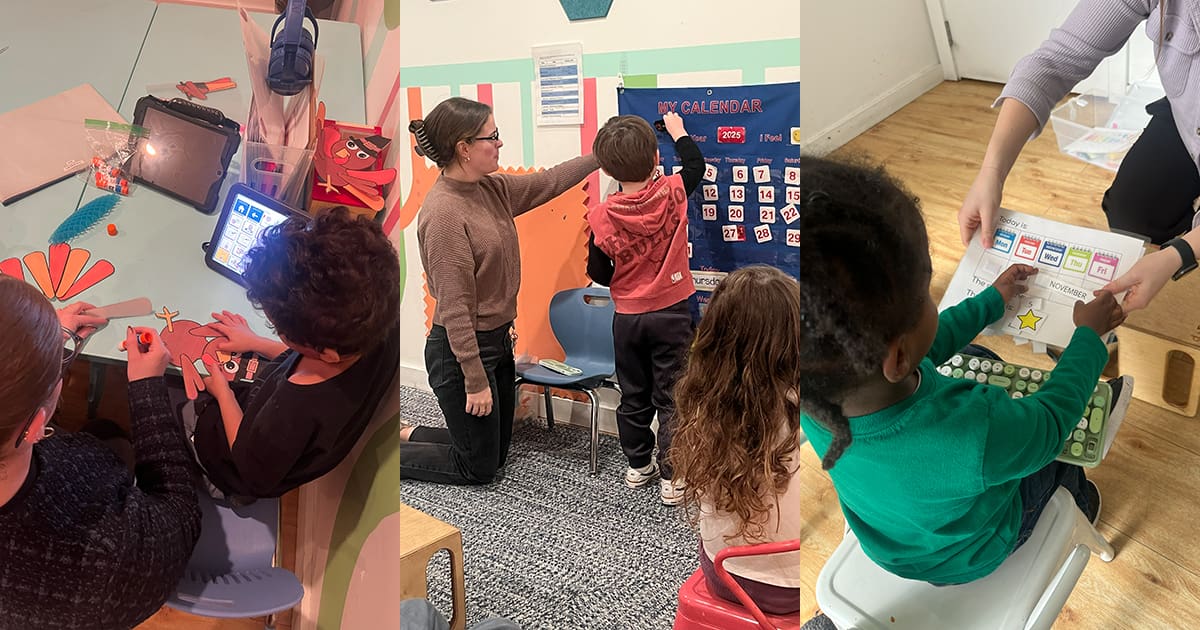Share this Post

Every child develops at their own pace, but for some, additional support can make all the difference. If your child struggles with communication, motor skills, or sensory processing, combining speech and occupational therapy can offer a powerful, integrative approach to help them thrive across environments—from home to school and beyond.
At CST Academy, we believe in the power of multidisciplinary care. Our team of speech-language pathologists and occupational therapists work together to create personalized therapy plans that support the whole child—not just one skill at a time, but a spectrum of interconnected abilities that promote lifelong growth.
Let’s explore how combining speech and occupational therapy can open new doors in your child’s development—and why a collaborative approach is often the most effective.
What Is Speech and Occupational Therapy?
Before we dive into the benefits of combining them, it’s important to understand what each therapy focuses on:
Speech Therapy
Speech-language pathologists (SLPs) help children with:
- Articulation and clarity of speech
- Language comprehension and expression
- Social communication (pragmatic language)
- Feeding and oral motor skills
- Fluency (e.g., stuttering) and voice quality
Learn More About CST Academy’s Speech Therapy Program
Occupational Therapy
Occupational therapists (OTs) support children in:
- Fine motor skills (writing, grasping, self-feeding)
- Gross motor skills (coordination and balance)
- Sensory processing and regulation
- Visual-motor integration
- Activities of daily living (ADLs), like dressing or using utensils
Learn More About CST Academy’s Occupational Therapy Program
Both therapies play essential roles in early childhood development—and when combined, the impact is multiplied.
1. Holistic Support for the Whole Child
Children rarely experience challenges in isolation. A child who struggles with motor planning may also have difficulty expressing frustration. A child with sensory sensitivities may resist participating in group conversations or structured classroom routines.
By integrating speech and occupational therapy, we’re able to:
- Address multiple developmental domains simultaneously
- Create more cohesive therapy goals
- Help children transfer progress from one area (e.g., motor skills) to another (e.g., expressive communication)
At CST Academy, our SLPs and OTs communicate regularly to align strategies and reinforce progress across sessions.
2. Enhanced Communication During Daily Activities
Real-world communication often happens while engaging in tasks—like getting dressed, playing, or eating. When speech and occupational therapy are combined, therapists can work side-by-side to help children:
- Use language during functional routines (e.g., asking for help during fine motor tasks)
- Practice turn-taking and joint attention during play
- Communicate discomfort or sensory needs using words or alternative communication tools
This cross-functional approach makes therapy more naturalistic and impactful.
3. Reinforcing Self-Regulation Through Collaborative Strategies
A child’s ability to communicate is deeply connected to their emotional and sensory regulation. When a child is dysregulated, their ability to speak, listen, or follow directions often diminishes. Occupational therapy helps children:
- Identify sensory triggers
- Use calming strategies (like deep pressure or movement breaks)
- Build body awareness and emotional control
Speech therapists can then build on that regulation by helping the child express needs and feelings verbally or through AAC (Augmentative and Alternative Communication).
Together, speech and occupational therapy provide a powerful foundation for emotional expression and behavioral success.
4. Improved Social and Play Skills
Many children receiving therapy struggle with social interaction, including initiating conversations, taking turns, or playing cooperatively. By combining speech and occupational therapy, we can:
- Teach communication skills through shared play
- Support social routines (e.g., greetings, group activities)
- Use sensory-friendly strategies to make social experiences more comfortable
This team approach helps children build real-world social connections that go far beyond the therapy room.
5. More Efficient Progress and Greater Consistency
When speech and occupational therapists collaborate, families often see faster and more consistent progress. That’s because:
- Therapy goals are reinforced across multiple settings
- Children benefit from consistent language and behavioral cues
- Families receive unified strategies they can use at home
At CST Academy, we ensure that all therapists working with your child are part of the same care team, communicating regularly and adjusting strategies as your child grows.
Real-Life Success: A Glimpse Into CST Academy’s Integrated Model
Meet “Ethan,” a 4-year-old who began at CST Academy with delays in both communication and fine motor development. His speech therapist focused on expanding vocabulary and using simple sentence structures, while his occupational therapist worked on strengthening hand muscles for utensil use and sensory modulation for classroom routines.
Because both therapists collaborated, Ethan practiced requesting his preferred tools in OT while learning to tolerate sensory textures during snack time—talking about what he was doing, how he felt, and what he needed.
After several months, Ethan showed increased independence, clearer speech, better sensory regulation, and improved confidence across settings.
Is a Combined Speech and Occupational Therapy Approach Right for Your Child?
If your child is receiving either speech or occupational therapy—and you’re still noticing challenges in other areas—it might be time to consider a combined approach. At CST Academy, we make it easy for families to access both therapies in a single, collaborative environment.
Our team is here to:
- Assess your child’s needs
- Create an integrated therapy plan
- Provide clear communication, updates, and strategies for home
Whether your child is just beginning therapy or you’re looking for a more comprehensive solution, we’re here to help you unlock their full potential.
Get Started with CST Academy
Are you ready to explore the benefits of speech and occupational therapy for your child?
Discover Our Pediatric Therapy & Autism Care
ABA Therapy
Support for children with autism.
Autism Evaluation
Expert assessments to identify child needs.
Pediatric Therapy Services
Speech, Occupational, Feeding, and Physical Therapy.
Therapeutic Preschool
A classroom environment designed for early learners with unique needs.

CST Academy Highlights the Speech & Occupational Therapy Benefits of Pediatric Therapy
Combining therapies for greater developmental impact and long-term success.
At CST Academy, we believe in the powerful synergy between Speech and Occupational Therapy, and how these therapies together unlock meaningful progress for children. Our Pediatric Therapy program is designed to integrate multiple disciplines, helping children improve communication, motor skills, independence, and overall confidence. The combined Speech & Occupational Therapy Benefits offered at CST Academy ensure a comprehensive, individualized approach that supports the whole child.

Find the Best Care for Your Child




